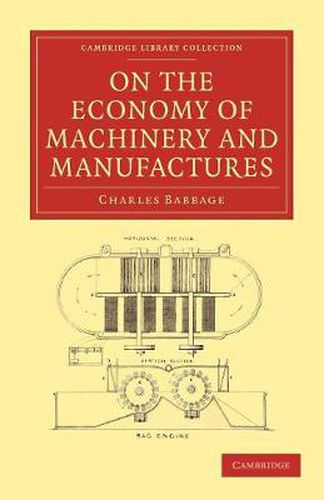Readings Newsletter
Become a Readings Member to make your shopping experience even easier.
Sign in or sign up for free!
You’re not far away from qualifying for FREE standard shipping within Australia
You’ve qualified for FREE standard shipping within Australia
The cart is loading…






In this famous book, first published in 1832, Charles Babbage (1791-1871), the mathematician, philosopher, engineer and inventor who originated the concept of a programmable computer, surveys manufacturing practices and discusses the political, moral and economic factors affecting them. The book met with hostility from the publishing industry on account of Babbage’s analysis of the manufacture and sale of books. Babbage describes the many different printing processes of the time, analyses the costs of book production and explains the publication process, before discussing the ‘too large’ profit margins of booksellers. Babbage succeeded in his aim ‘to avoid all technical terms, and to describe in concise language’, making this an eminently readable historical account. His analysis and promotion of mechanisation and efficient ‘division of labour’ (still known as the ‘Babbage principle’) continue to resonate strongly for modern industrial engineering.
$9.00 standard shipping within Australia
FREE standard shipping within Australia for orders over $100.00
Express & International shipping calculated at checkout
In this famous book, first published in 1832, Charles Babbage (1791-1871), the mathematician, philosopher, engineer and inventor who originated the concept of a programmable computer, surveys manufacturing practices and discusses the political, moral and economic factors affecting them. The book met with hostility from the publishing industry on account of Babbage’s analysis of the manufacture and sale of books. Babbage describes the many different printing processes of the time, analyses the costs of book production and explains the publication process, before discussing the ‘too large’ profit margins of booksellers. Babbage succeeded in his aim ‘to avoid all technical terms, and to describe in concise language’, making this an eminently readable historical account. His analysis and promotion of mechanisation and efficient ‘division of labour’ (still known as the ‘Babbage principle’) continue to resonate strongly for modern industrial engineering.